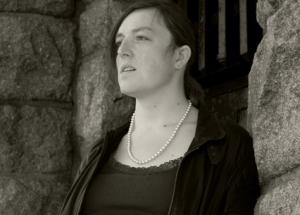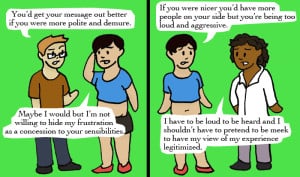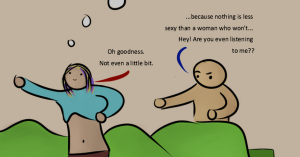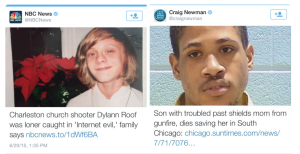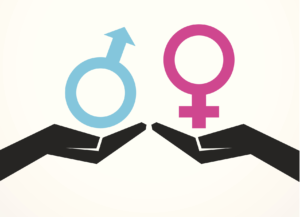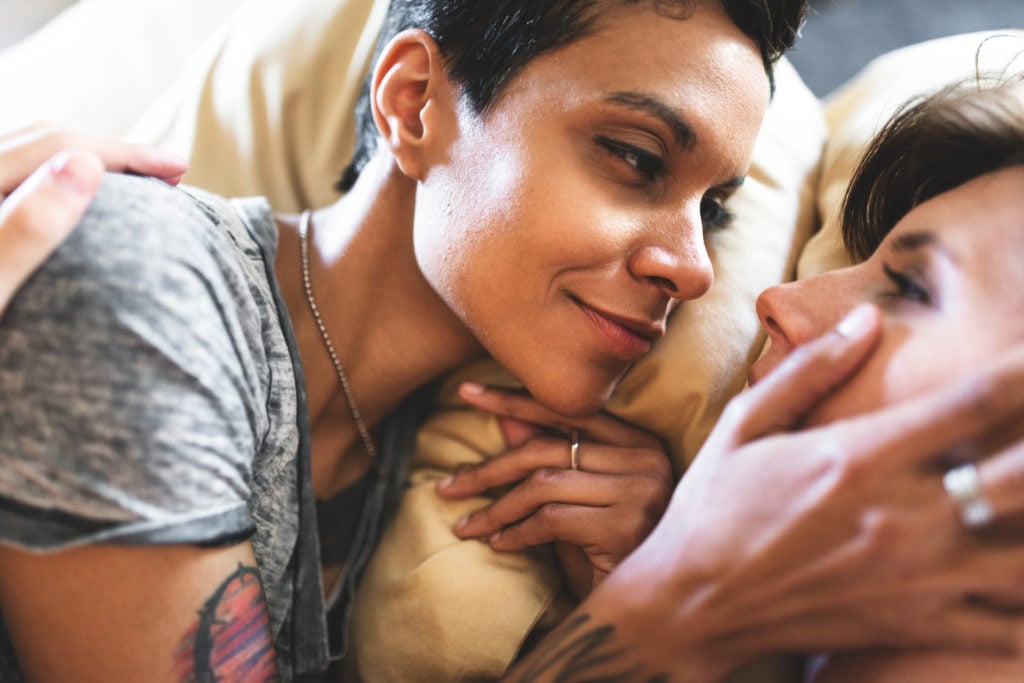
Affectionate couple on bed
In my experience, one of the most frustrating challenges about living with a mental illness is that the seemingly small things in life are often the most difficult. Take a first date, for example… or just trying to get a first date.
“I’d see things on dating profiles like ‘no crazy chicks haha’ or ‘if you have bipolar swipe left, no offense, just a preference,’” said Naomi Elise Hall of Fort Wayne, IN. She lives with bipolar II, schizoaffective disorder, and complex post-traumatic-stress disorder.
When everything is uncertain and depends on how the chemicals in your brain are interacting with each other, the equation of trying to balance life with a mental illness is a messy one. That goes for both love and relationships.
While there is yet to be a dating manual for mentally ill folks, we can guide each other. I was fortunate to speak with several brave women who are open about their mental health. They shared their stories and advice for people with mental illnesses who want a chance at love — of all kinds.
Here’s the list we came up with:
1. Stigma around mental health hurts. No matter what others say, know you are always deserving of healthy, supportive, and real love.
Dating while mentally ill can be a positive experience, but, unfortunately, mental health stigma is real and definitely impacts the dating lives of mentally ill people.
“I get [stigma around mental health], I do… I mean I’m not easy to deal with, but seeing things like that still stung,” said Hall, who says being a mentally ill Black woman kind of puts her in the undesirable category as far as dating goes.
“When I reveal my diagnoses they either ghost right away or withdraw slowly but surely. I’ve had partners who have gaslit [and] abused me, blamed my trauma on my illness, [or try to have] me committed for minor infractions.”
Since these experiences, Hall has found and been in a happy relationship with a man also affected by mental illness. Their third anniversary is in October.
Being called a “psycho,” “crazy,” or other cruel words, being mistreated and abused around your mental illness are never your fault.
The impact of those words and actions hurt, and their consequences are real, but the hatred and shame that these people are telling you to feel are not the reality of who you are. It is possible to find not just love, but the healthy, supportive, real love that you deserve.
2. It can be scary to talk to people you are interested in about your mental health. However, honesty is worth it to find someone who values you for you.
“Telling people your mental health status can be scary at the best of times, let alone if you’re also trying to get them into bed,” wrote Emily Reynolds in Dazed. “You don’t actually think ‘God, how am I going to tell almost every single person I have ever have sex with again?’”
Initiating this kind of transparency in any kind of relationship (sexual or not) can be incredibly difficult, especially depending on what challenges your conditions present. While there is no such thing as perfect timing, you can prepare for when you are ready… but how can you tell?
Everyone is different. Personally, my way of knowing when to tell someone my diagnosis is when I begin to trust them — not entirely, but enough to tell them this detail of my life.
I have also found it helpful to ask myself: how healthy is this relationship so far? Do I feel like it will get even healthier, or not? Do I feel safe with this person? If I don’t feel as safe as I would like to yet, do I feel like I can work with this person to make that happen?
The best advice I can give is to listen to yourself and your feelings. Although these may be affected by your mental illness, your feelings and experiences still matter.
“Be upfront about your mental illness. I know it is hard and scary but it’s beneficial for both of you,” said Raé Williams, a recent college graduate based in Salem, Massachusetts who lives with depression and anxiety.
“You can know whether or not it’s worth pursuing with that person and then they can understand you better. It doesn’t have to be disclosed on the first date but I feel if you see a future with that person, talk about it.”
The more you have this conversation, the more you will be able to determine what you want in other people, and what you will not accept. In doing this, you are directly investing in not only your future relationship, but your own well-being.
3. Hard moments will come, but you can prepare yourself. And so can the people you love.
Whether you are seeing people or are partnered, it is entirely possible to be happy while dating with a mental illness, and to enjoy it while things are good. However, it is also important to account for what may happen, and how you want to go about those moments with the people you care for.
“First of all, remember that your partner is not a 24/7 therapist or a solution to your problems. You have to solve your issues yourself,” said Amy Fan, a social media manager in San Francisco, CA. Fan lives with dysthymia and anxiety.
“Just make sure you have a partner that is there to support you with encouragement and their presence. Recognize your own problematic coping mechanisms and toxic behaviors and work on them. At the same time, don’t beat yourself up on past mistakes. We all go through them.”
Every person is different, as is your relationship.
There is no fail-proof, universal way to handle hard moments, but you can prepare yourself by realistically thinking about what you, and whoever you are interested in, can do to prepare and face them together.
Questions to ask yourselves include: Are we able to communicate about our mental health and needs in a healthy way? How much am I asking of my partner? How much is my partner asking of me? Are we both committed to having a relationship not in spite of, but informed by, my/our/your mental illness?
4. When mental illness is present in a relationship, making it “equal” is not always possible. Give what you can, when you can.
While we strive to give what we can to the relationship, it is not always going to be perfectly balanced, and that is okay — as long as we are aware of it and address it with responsibility and love to our partners.
“There’s this 50/50 mindset that each partner should be putting in equal amounts of work at all times, but that is not always possible when it comes to the human condition,” said Caitie Gutierrez of The Bumblefly Effect, a global intersectional mental health collective based in Sydney, Australia.
Gutierrez lives with generalized anxiety disorder and depression. “Sometimes it will have to be 60/40 and other times it could even be 10/90 if you are dating someone with a mental/chronic illness or disability… The balance will always be shifting because that’s just life.”
A healthy relationship is entirely possible, regardless of how the balance shifts and changes over time.
If you can address these changes, be informed by everything that is going on within your relationship, and grow to hold yourself and the people you love with support, honesty, and communication, you’ve got a lot in your toolbox already — and that includes the people who are working on these things, too.
5. If you are unaffected by mental illness and dating someone who is, it is your responsibility to educate yourself, and care for them as your partner. But it is not your responsibility to save them.
“Remember that you are not their savior. You have to let them conquer their battles,” said Fan. “[However, you can] Google a basic guide on how to listen to people that have depression, [and] ask them how THEY would like to be helped.”
Mentally ill people are often erased from the conversation on how they would like to be supported during times of struggle. If you go ahead and try to do something for someone without asking, your attempt to help could actually be harmful.
It is also just as important to check in with yourself, especially if you are a mentally ill person in a relationship with another mentally ill person. Your health and well-being always matters too.
“Always remember, it is not your job to ‘fix’ someone with a mental illness,” said Gutierrez. “They are not broken. They are a whole person. Your love, support, and understanding is the best thing you can offer – just like any other relationship. And please practice self-care. Your needs are just as important.”
***
Love can be, and is, a refuge for many with mental illness, and when we do have it, we want to keep it.
As hard as we fight with symptoms that affect our everyday lives and self-advocate for ourselves over, and over, and over, it is important to say that mentally ill people deserve to be able to enjoy love, dating, and relationships.
“For the most part, life is a struggle for a lot of us,” said Hall, “and we’re just looking for a reprieve from the prying and judgemental eye of society. Give us a break and get to know us without reserve… we are some of the funniest, most resilient and brave people you will meet.”
[do_widget id=’text-101′]
Sophia Stephens is a freelance writer, journalist, speaker, educator and advocate based in Seattle, where she/they work with local and national organizations including The Stranger, Kids & Race, Seattle Theatre Group, Distinction Music Management, Youth Radio, and Northwest Asian Weekly. Sophia’s work primarily engages with issues of radical intersectional social justice, politics, and popular culture, but they will always write a good story about their cat for you if you ask. If interested in connecting, you can find Sophia on Instagram and Twitter: @sophia_akiko.
Search our 3000+ articles!
Read our articles about:
Our online racial justice training
Used by hundreds of universities, non-profits, and businesses.
Click to learn more





